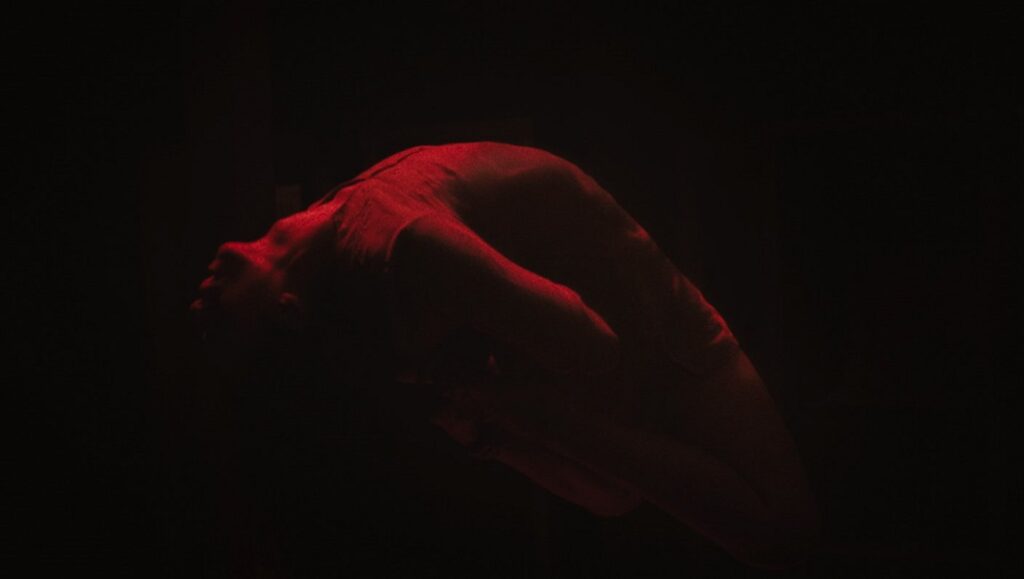The Night House might only be the latest horror film to supplant subtext with text and dread with loud sounds, but notable for being among the worst recent offenders.
The mid-pandemic dumping of new cult favorite The Empty Man caused some worry that Disney would not know what to do with an R-rated horror film in the wake of their merger with Fox — the worst thing to happen to movies in the past decade, pandemic included. But Searchlight acquired The Night House a year after the merger, during Sundance 2020, and is releasing the film into comparatively healthier theaters now. Makes sense, as David Bruckner’s film could not be more different than The Empty Man, a strange, almost out-of-time film Fox had been sitting on for years before Disney that was doomed to fail at the box office but which is so uniquely structured and ambiguous that its cult appeal now seems like a no-brainer. The Night House, then, is an easy sell, a haunted house movie headlined by Rebecca Hall that rode a wave of acclaim from its festival premiere. It’s tight and intended to terrify, a barrage of jump scares that might thrill a packed house. But it’s also tiresome and grating, reliant on cheap tricks to achieve smug, dimwitted ends.
Hall stars as Beth, an English teacher dealing with the sudden suicide of her husband, Owen (Evan Jonigkeit). Alone in the house her husband built, she finds herself haunted, by both grief and a literal ghost, though the line between the two is kept thin, which is only initially compelling. Owen’s cryptic note leads Beth down a rabbit hole of investigation into her husband’s secret life, leading most importantly to the reveal that he was building a secret house, the floorplan the reverse of their home, in the woods. In the daytime, Beth is frazzled from the opening, frayed at all ends and becoming increasingly confrontational with the people trying to help her as she inadvisably plays detective, digging up mysteries she couldn’t possibly like the solutions to.
But for all that, at night it’s just a haunted house movie carried forward by its scary sequences. David Bruckner directs competently but without inspiration. Lots of still frames call attention to their being obviously composed, though the compositions in question are rarely novel, even when leading viewers into a game of Where’s Waldo?: find the spooky something in the image. And it’s hard to tell if the craft in the haunting sequences is actually up to par when the film uses sound like a crutch; every jumpscare, of which there are plenty, is accompanied by the loudest possible noise. Sometimes deafening volume on the soundtrack is used in place of anything on screen at all — viewers who find themselves on the edge of their seat likely won’t be so situated from terror on Beth’s behalf, but out of concern for their own eardrums. In other words, Bruckner deploys the most familiar trappings of the genre and overcompensates, like so many do, with a grating soundscape, the impression as if The Night House is screaming “Please be scared” at every turn, a sign of a lack of confidence that carries over into its theming, as if yet another horror movie about this subject could possibly be misunderstood.
While it’s frustrating enough that most contemporary mainstream horror is about the same ideas of grief and trauma, what’s worse is the desire to constantly turn that subtext into text, literalizing the metaphors and placing the movie within a hermetic seal. In the past, horror films have functioned as catharsis and have been academically generative often by functioning as cinematic rorschachs, reflections of personal and societal anxieties that, even when incidental, produced a variety of readings that could be lived with, debated, and contradicted long after the movie had ended. By contrast, the modern horror film — not just the A24 set, but multiplex fare like The Invisible Woman, too — seems leaden with meaning, designed first and foremost to make sure you get it.
The Night House is among the worst offenders in this regard. Bruckner uses his film’s climax primarily to explain himself, stripping his film of textual mystery in favor of superficial depth, as if by virtue of meaning something — even if it only means one thing and it’s the same thing as everything else — his film might be elevated above horror movies that simply seek thrills. It doesn’t help that his ultimate reading of grief is shallow and myopically self-centered to the point of near immorality, turning a blind eye to the pain of others to look further inward (to elaborate further would ruin the film’s big twist). If Bruckner leaves the audience with anything to chew on, it’s only simplistic questions regarding the plot: Was she really haunted? Was that all in her head? Those are questions Bruckner is happy to leave hanging; whatever answers you might come up with leave the text — his precious meaning — intact and unaltered. In the ways that matter, though, The Night House is a closed loop, a scary movie about “big ideas” that wall themselves off and stay safely on the screen. It might shake you through sheer force (and sound), but it won’t haunt anyone for very long.


Comments are closed.